SNP leadership: How will Nicola Sturgeon be replaced as Scotland's first minister?
The SNP has elected Humza Yousaf as its new party leader.
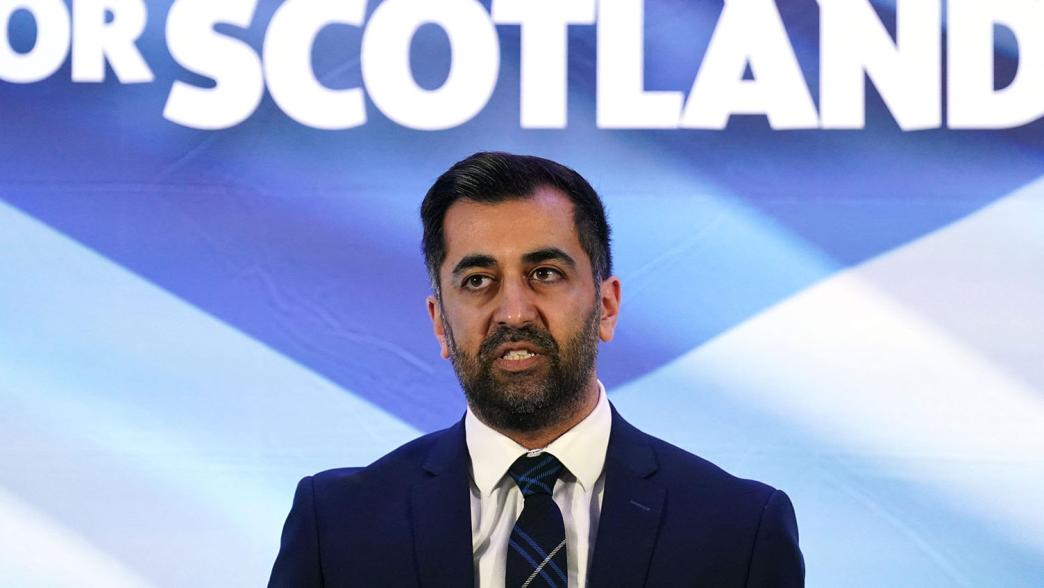
On 15 February, Nicola Sturgeon unexpectedly announced her intention to resign as first minister of Scotland. On 27 March, the SNP elected Humza Yousaf as new party leader, who was then formally appointed as first minister following a vote in the Scottish parliament.
How did the SNP elect its next leader?
The SNP had not held a contested leadership election since 2004. When Nicola Sturgeon succeeded Alex Salmond in 2014, she was the only candidate to put herself forward and was automatically elected.
The SNP’s national executive committee met on 16 February to agree the following timeline for the leadership election:
- 16 February: Nominations opened
- 24 February: Nominations closed
- 13 March: Voting opened
- 27 March: Voting closed and result announced
Potential candidates needed to gather 100 nominations from members in at least 20 local branches across Scotland. All SNP members had a vote, and the election used a preferential voting system. MPs or MSPs did not have a special role in this process.
Members must have joined the party before 15 February (the day Sturgeon resigned) to be eligible to vote. Most votes were cast online, via the voting platform Mi-Voice, with a small number of postal ballots dispatched to members without an email address.
The SNP has 72,186 members, down from the previous figure of 104,884 in December 2022. Membership numbers were initially not released, drawing criticism from candidates over the lack of transparency. undefined The Sun, ‘SNP membership figures revealed in major update to leadership race after ‘rigged vote’ claims’
Questions had also been raised about oversight of the election. Kate Forbes and Ash Regan both called for an independent auditor to oversee the votes to protect the integrity of the election. However, the SNP’s national secretary said she was “satisfied as to the integrity of the ballot” and confirmed that nobody in the SNP had access to the live voting figures. undefined The Sun, ‘SNP membership figures revealed in major update to leadership race after ‘rigged vote’ claims’
Humza Yousaf was elected as SNP leader on 27 March. He received 48% of first preference votes, with Forbes receiving 41% and 11% for Regan. He was subsequently elected on second preference votes, where he received 52% to Forbes 48%.
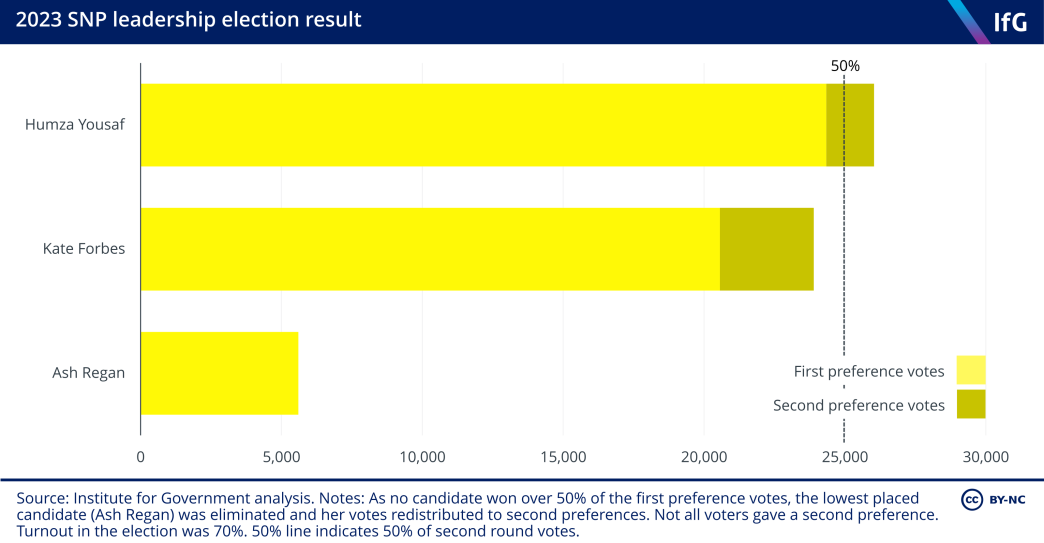
What was the process to elect a new first minister?
The Scotland Act 1998 and the Scottish parliament’s standing orders govern how the first minister is formally appointed.
Following the conclusion of the SNP’s leadership election, Nicola Sturgeon submitted her resignation as first minister to the King. The Scottish parliament was then be asked to recommend who the King should appoint as new first minister on 28 March.
Any MSP could theoretically stand for election as first minister. In addition to Humza Yousaf, the leaders of the Scottish Conservatives, Scottish Labour, and the Scottish Liberal Democrats also stood.
All candidates for the post set out their case to become first minister before MSPs voted for their preferred candidate. Yousaf was successfully nominated, winning 71 votes, compared with 31 for Douglas Ross, 22 for Anas Sarwar, and four for Alex Cole-Hamilton. In addition to the 64 SNP MSPs, the seven Scottish Green MSPs voted for Yousaf due to the ‘cooperation agreement’ between the two parties.
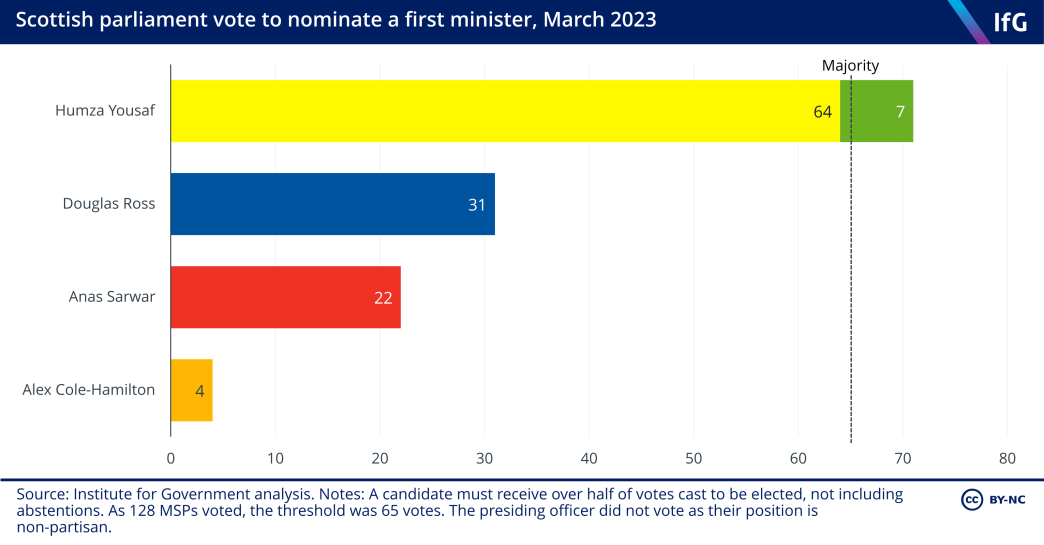
After the Scottish parliament’s nomination, the presiding officer formally recommended Yousaf to the King for appointment as first minister. A royal warrant was then issued appointing Humza Yousaf as first minister. He accepted the appointment by taking the oath of office at the court of session on 29 March.
Yousaf is the sixth person to hold the post since devolution began in 1999 and the third from the SNP.
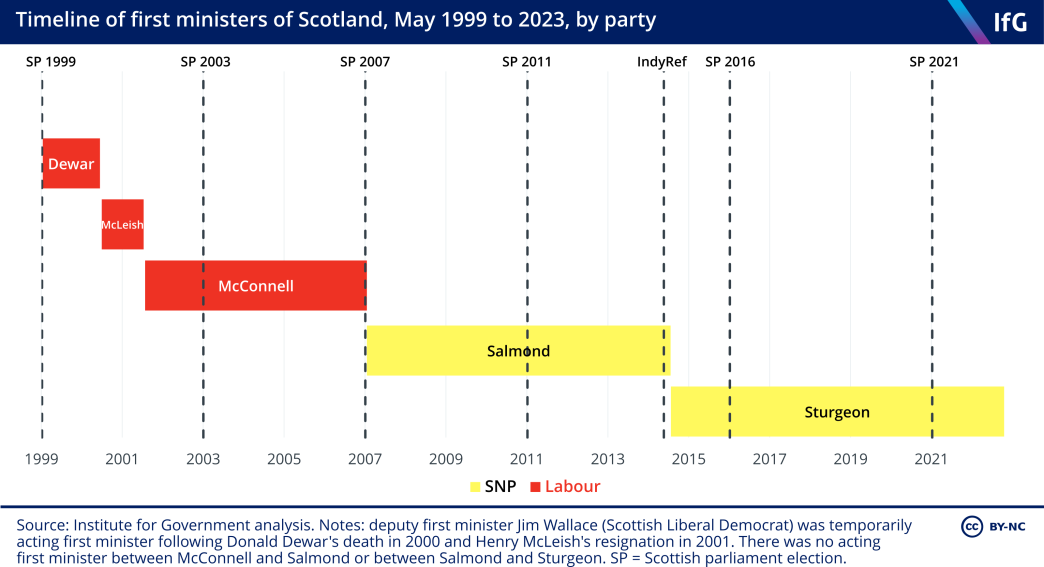
Who stood to succeed Sturgeon?
Health and social care secretary Humza Yousaf was the first to announce his candidacy. Yousaf has been an MSP since 2011. He previously served as Europe minister, transport minister, and justice secretary, before being appointed as health and social care secretary in 2021.
Then-finance secretary Kate Forbes also stood to replace Sturgeon. She was first elected to Holyrood in 2016, appointed as a junior finance minister in 2018, and made cabinet secretary for finance and the economy in 2020. She went on maternity leave in July 2022 but returned early to contest the election.
Ash Regan was the third confirmed candidate. She was elected to Holyrood in 2016. Regan was appointed community safety minister in 2018. She resigned from this role in 2022 to vote against the Scottish government’s gender recognition reform bill.
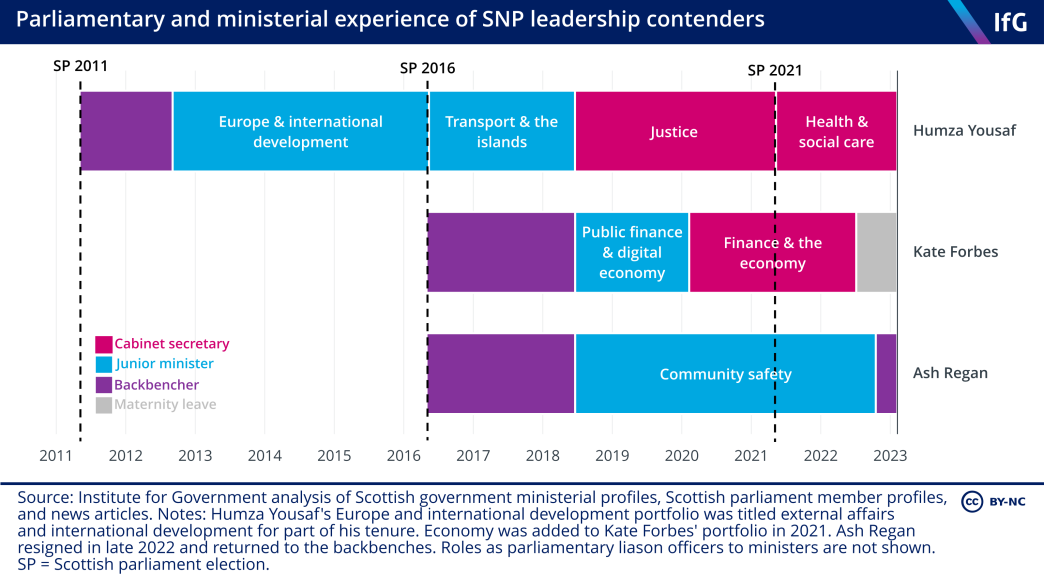
Other potential candidates swiftly ruled themselves out of the contest, including MSPs John Swinney (deputy first minister), Angus Robertson (constitution secretary) Keith Brown (justice secretary), Mairi McAllan (environment minister), and Neil Gray (culture minister) as well as MPs Stephen Flynn (SNP Westminster leader) and Joanna Cherry (former SNP home affairs and justice spokesperson at Westminster).
What does Sturgeon’s resignation mean for the SNP’s independence strategy?
The Supreme Court ruled in November 2022 that the Scottish parliament could not hold a referendum without Westminster approval. Sturgeon’s declared ‘plan B’ was to use the next general election as a ‘de facto referendum’ on independence.
Following the Supreme Court’s decision, Sturgeon announced a ‘Special Democracy Conference’ would be held on 19 March 2023 for the SNP membership to decide the next steps.
Sturgeon initially indicated that the special party conference would go ahead as planned and stated that her resignation left the party “free to choose” its next steps. However, the SNP’s NEC subsequently postponed the conference until after the leadership election.
What options does the SNP now have for how to secure independence?
Under Nicola Sturgeon’s preferred approach, the SNP was to define the next UK general election as a de facto referendum on independence. If the SNP and other pro-independence parties received over 50% of the vote, the SNP would “consider that a mandate to enter negotiations with the UK government to secure independence”. In such an event, the UK government would have no legal obligation to participate in independence negotiations.
An alternative version of this strategy would use the 2026 Holyrood elections as the de facto referendum instead.
Ash Regan has voiced support for the de facto referendum approach, arguing that if pro-independence parties win over 50% of the vote in any future Holyrood or Westminster election, this would provide “a democratic mandate for independence”. 10 STV, ‘In full: First Minister candidates go head-to-head in STV debate’, https://www.youtube.com/watch?v=p3YTBxPNs6o. Regan has also proposed an independence convention, bringing together all pro-independence parties and other civil society groups to develop a detailed plan for independence.
Humza Yousaf has distanced himself from the de facto referendum strategy, saying “there’s no magic wand that can deliver independence”. Promising to consult SNP members on “every option that is within a legal framework”, Yousaf believes “the route to independence is by growing popular support”. 11 Financial Times, ‘No ‘magic wand’ for Scottish independence, warns SNP leadership candidate’, https://www.ft.com/content/d612f37f-0485-4bf2-8025-2a003f4c633e.
Kate Forbes also believes the best approach is to build sustained public support for Scottish independence, saying “we’ll get independence when we have persuaded a majority of people in Scotland to vote for independence”. Forbes argues that this “requires a leader who does not just inspire the Yes movement, but can also reach out to those who are not yet persuaded”. 12 STV, ‘In full: First Minister candidates go head-to-head in STV debate’, https://www.youtube.com/watch?v=p3YTBxPNs6o.
- Topic
- Devolution
- United Kingdom
- Scotland
- Political party
- Scottish National Party
- Position
- First minister of Scotland
- Devolved administration
- Scottish government
- Legislature
- Scottish parliament
- Public figures
- Nicola Sturgeon
- Publisher
- Institute for Government